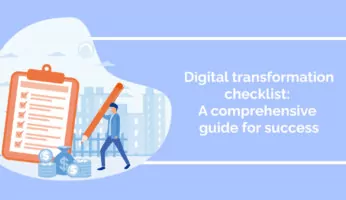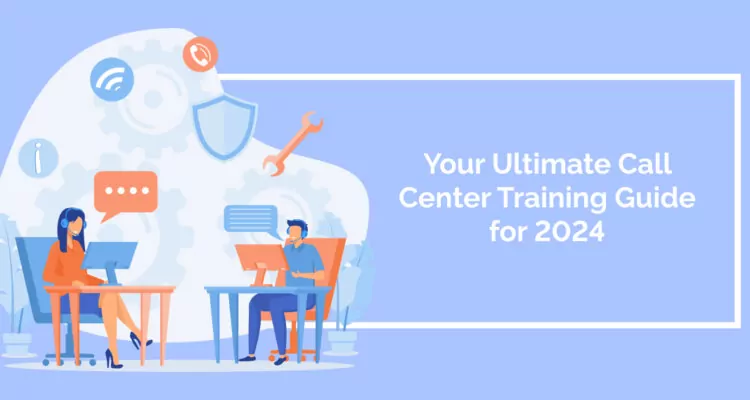
Effective call center training is vital for delivering a top-notch customer experience.
It stands out as one of the critical strategies to ensure exceptional customer engagement by building trust and fostering brand loyalty.
59% of customers prefer speaking about products on the phone, so this is where you need to focus resources to keep customers engaged and loyal to your brand.
Call center training, where you train your staff to give the best customer service over telephone lines, is essential, whether cold or warm calling.
Within our ultimate call center training guide for 2024, we will explore the following topics:
- What is call center training?
- Why call center training is important
- Strategies to enhance remote call center training in 2024
- Key elements of the call center training activity
- Core skills to teach in call center training
What is call center training?

Training for call center agents involves equipping individuals with the skills to serve as customer service representatives in call centers.
Call center training typically encompasses:
- Honing communication skills.
- Providing knowledge about products or services.
- Imparting call-handling techniques.
- Instilling customer service best practices.
- Familiarizing agents with company policies and procedures.
The goal is to ensure agents can effectively interact with customers and provide high-quality service.
Why is call center training important?
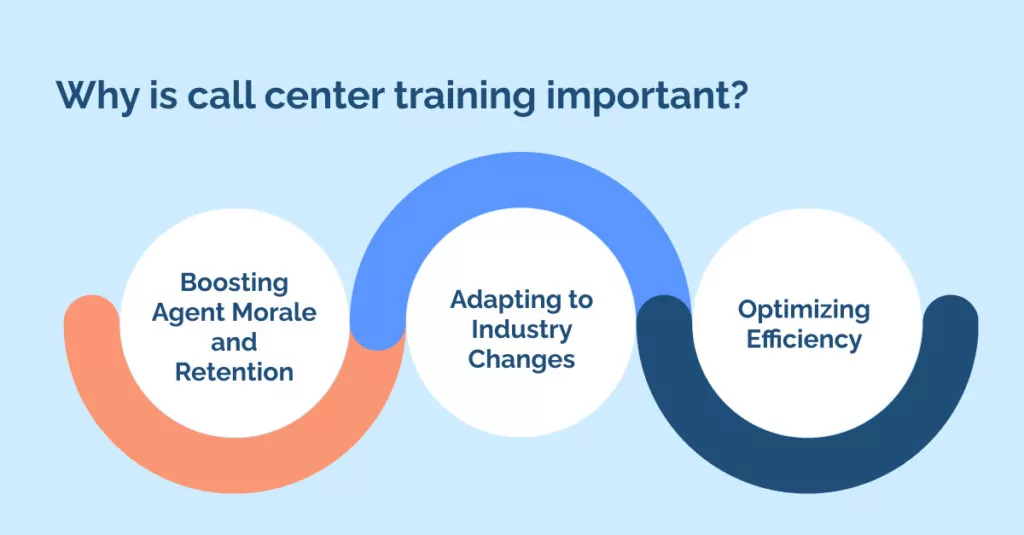
Call center agent training holds significant importance for several reasons, the first of which is boosting agent morale and employee retention.
1. Boosting Agent Morale and Retention
Insufficient training contributes to the call center industry’s high employee attrition.
A substantial attrition rate results in the company spending three to four times an agent’s monthly salary on hiring and onboarding new staff.
Continuous learning and development can elevate employee engagement, enhance productivity, and mitigate attrition.
2. Adapting to Industry Changes
Encouraging their participation in events and conferences is crucial to keep agents abreast of evolving industry trends.
These opportunities allow them to network with peers, stay informed about new technologies, and gain insights into best practices.
Additionally, knowledge management systems can facilitate easy access to the latest information and best practices.
3. Optimizing Efficiency
Well-trained agents handle customer interactions more efficiently.
Adequate product awareness and training significantly increase the number of calls each agent can manage effectively.
Proper training also minimizes errors, such as providing incorrect information or mishandling calls.
Strategies to enhance remote call center training in 2024
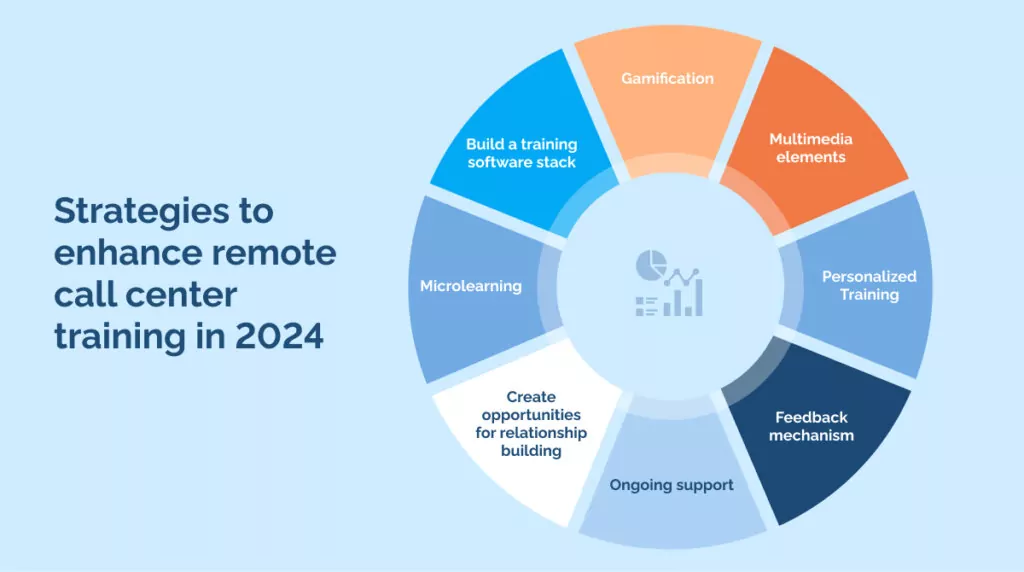
Times have changed, and call centers are no longer large offices with hundreds of cubicles.
Today, most call centers are remote, often based in employees’ homes. This knowledge is essential when creating a call center training strategy in 2024 and beyond.
The first of these strategies involves microlearning to allow staff to learn little and often so their knowledge is current and their customers satisfied.
1. Microlearning
Microlearning involves breaking down learning content into bite-sized modules, enhancing knowledge retention as learners promptly apply acquired skills.
Call center training aims to curate concise, self-contained modules focused on specific skills or topics. For instance, a brief video on customer interaction followed by a related quiz facilitates effective learning for agents.
This training approach is efficient and accessible, allowing agents to learn at their convenience.
They can adapt learning to their work schedules, progress through modules at their preferred pace, revisit or skip topics, and create a flexible learning schedule without compromising employee productivity.
2. Build a training software stack
A training software stack constitutes the tools guiding agents through your training program.
It is significant for remote teams, ensuring consistent and efficient agent training. These tools facilitate continuous monitoring, even in a remote work environment.
Five categories of call center training tools contribute to enhanced team training:
- Onboarding tools: Tailor learning programs, simulate real scenarios, and offer performance feedback opportunities.
- Knowledge management tools: Centralize eLearning and support content, providing 24/7 accessibility.
- Collaboration tools: Facilitate communication among new agents, fostering the exchange of best practices and knowledge.
- Artificial Intelligence (AI) based guidance tools: Assess customer and agent emotions through tone of voice, offering suggested responses for a continual learning experience in each call.
- Whisper coaching tools: Enable team leads and colleagues to guide agents through customer calls discreetly, without the customers being aware.
3. Gamification
The global gamification market is worth 5.3 billion USD, with a likely compound average growth rate of 32.7% heading toward 2027.
Gamified training integrates gaming elements, like points and badges, into courses, injecting a fresh perspective into workplace learning.
This approach effortlessly captivates learners, motivating them to tackle repetitive tasks despite possible failure.
Incorporating game elements not only enhances engagement but also nurtures creativity and innovation among employees.
The training becomes more enjoyable, and the feedback cycles shorten as employees receive immediate feedback, allowing for continuous improvement.
Utilizing gamification proves to be a stellar strategy for call center training, tapping into the inherent human inclination for competition and achievement.
It transforms the training process into an interactive and enjoyable experience.
4. Multimedia elements
Multimedia elements enhance the learning experience, adding engagement and interactivity.
Practical instances of multimedia in training modules include:
- Videos: Brief training videos covering various topics, like handling specific customer interactions, can be integrated into training modules.
- Infographics: An effective tool for presenting complex information, such as call center metrics and customer satisfaction scores.
- Interactive simulations: Simulations recreate real-life scenarios encountered by call center agents, allowing for skill practice and confidence building.
- Audio: Audio modules cater to visual learners, providing an alternative way to absorb information through listening. Companies can include audio modules in their training material, allowing learners to absorb information on the go.
5. Personalized Training
Customizing your call center training programs involves recommending distinct learning paths for each agent, aligning with their professional requirements and career aspirations.
A digital adoption platform (DAP) is a great way to achieve this, as you can adjust it to the training needs of any employee.
Personalized training through a DAP empowers employees to take control of their learning and development, resulting in an improved employee experience and engagement.
Tailoring training programs becomes achievable for companies by developing a repository containing pertinent training content, including video courses, articles, and microlearning modules, tailored to individual learner needs.
By incorporating a digital adoption platform, L&D teams can craft in-app learning experiences using dynamic formats like video, slideshows, and PDFs. This approach empowers users to attain proficiency swiftly and effectively.
6. Feedback mechanism
Fostering a feedback culture among call center agents is crucial for promoting ongoing professional development and enhancing agent performance.
Creating an efficient feedback mechanism involves investing in real-time feedback tools, arranging periodic one-on-one feedback sessions, and conducting weekly group calls.
These initiatives allow employees to share recent successes and challenges, cultivating a collaborative environment for giving and receiving feedback.
7. Ongoing support
Continuous support is a vital element in training call center agents. This step refers to the sustained training and coaching offered to agents after completing their initial training program.
This ongoing support guarantees that agents possess the necessary knowledge, skills, and assistance to deliver exceptional customer service and meet organizational objectives.
It increases job satisfaction and assures employers invest in their employees’ success and growth.
8. Create opportunities for relationship building
It is crucial to establish robust and positive connections between call center agents and their customers, even without face-to-face interaction.
Strong workplace relationships foster trust, enable effective conflict management, and motivate agents to learn from one another.
Call centers can enhance customer satisfaction and boost retention by providing employees with the skills and strategies to cultivate resilient customer relationships.
Core skills to teach in call center training
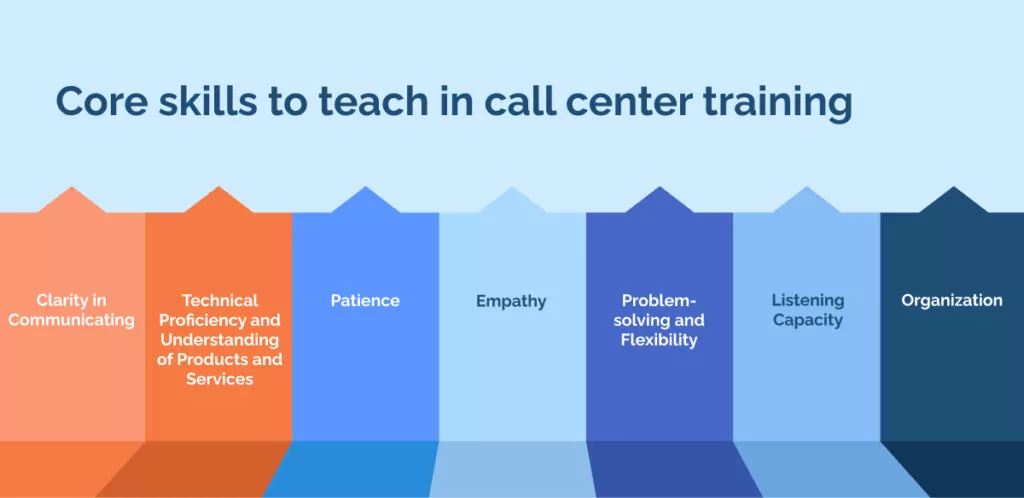
There are seven core skills to include within a call center training program to ensure your employees can satisfy customers every time.
1. Clarity in Communicating
Keeping conversations clear and productive helps resolve customers’ issues and make a good impression.
Carefully considering your responses and providing clear, understandable answers contributes to time efficiency, reducing the need for extensive back-and-forth communication between you and the customer.
2. Technical Proficiency and Understanding of Products and Services
Expertise in the domain is a straightforward advantage for any call center team.
Ensuring agents possess comprehensive knowledge about the company’s products, services, common complaints, and solutions can significantly enhance the customer’s call center experience.
Customer service agents well-versed in the intricacies of a product can offer more fitting recommendations and efficiently resolve complex issues regularly.
3. Patience
In a call center setting, patience involves giving customers the space to articulate their concerns and actively participating in meeting their expectations.
This skill becomes invaluable when handling particularly upset or confused customers. A patient representative dedicating time to address their concerns leaves a lasting positive impression.
Conversely, a call center representative lacking patience might permanently deter the individual from the company, underscoring the importance of patience in your call center training tips for employees.
4. Empathy
Authentically displaying empathy in a call center establishes a positive rapport with callers who may be worried, uncertain, or troubled. This behavior is something call center managers should exemplify for their team members.
Customers who feel understood and valued often find comfort throughout the call, making issue resolution significantly more straightforward.
5. Problem-solving and Flexibility
Efficient problem-solving often revolves around an agent’s capacity to think independently. Agents can conserve valuable resources When they act on their ideas and address issues autonomously.
Call center workers proficient in accurately defining, evaluating, and solving problems will assist more customers in a shorter timeframe.
6. Listening Capacity
The ability to listen intently to customers as they describe their difficulties pairs closely with clear soft skills like communication and building meaningful relationships with customers.
Active listening helps agents capture critical details throughout the exchange as part of good customer service.
Attentive call center agents can reduce the calls from individual clients seeking issue resolution. This approach enables agents to offer support and suggestions based on the comprehensive details available to both parties.
7. Organization
Maintaining the organization as a call center representative goes beyond having a neat physical workspace. Diverse organizational skills such as note-taking, time management, and prioritization assist agents in managing their daily workloads.
Maintaining organization reduces the risk of losing sight of the omnichannel customer journey and the details provided by the customer up to a particular point.
Make a DAP the focus of your call center training efforts
Shift your call center training paradigm by making a digital adoption platform (DAP) the core of everything you do.
Enhance agent proficiency and adaptability with real-time guidance, reducing onboarding time and improving customer interactions.
Elevate your call center’s performance by embracing a dynamic and user-centric approach to learning by implementing a robust digital adoption platform.
Tristan Ovington
Tristan Ovington is a professional senior writer and journalist, specializing in providing expert insights on various topics such as digital adoption, digital transformation, change management, and Cloud apps. He delivers his knowledge through accessible online content that is data-driven and presented in a friendly tone, making it easy for readers to understand and implement.


